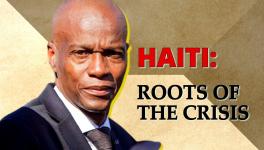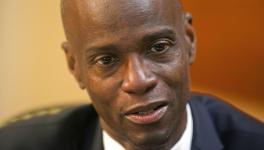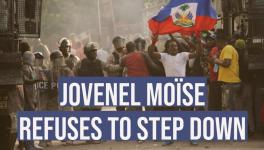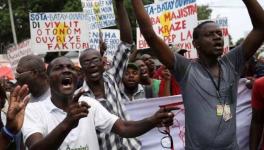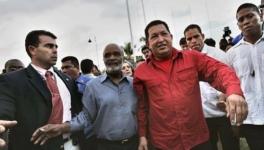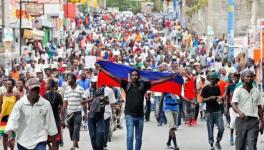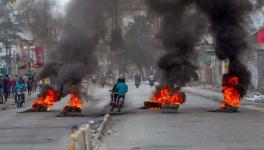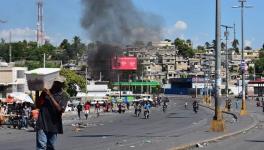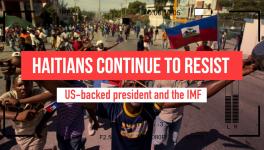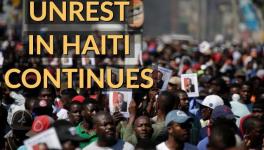‘We Must Live Like People’: Chronicle Of a Red-Hot Haiti
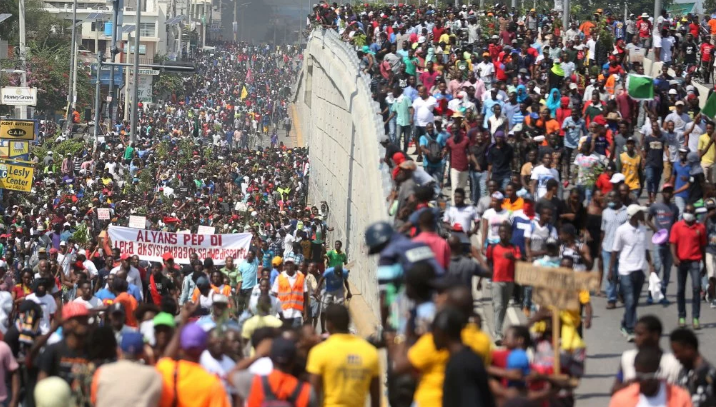
A wave of anti-government protests has been taking place in Haiti since February 7 (Photo: Alba Movimientos)
The social climate is heating up in Haiti, as social frustrations accumulate in a minefield that never ends up being deactivated. After last year’s intense mobilizations, with massive and radical epicenters in the months of July, October and November, the strategic truce at the end of the year gave rise to a materially precarious, but calm, Christmas. But the festivities were nothing more than a brief interval. Soon the battles would resume against the high cost-of-living, persistent corruption, social and economic crisis and the absence of a national model for the first independent republic emerging from the history of this side of Rio Bravo. The protests have been occurring for the last twelve intense days, and nothing seems to indicate that they are going to stop.
The first signs of this new cycle of protests were manifested in our own town [where the brigade member lives], when the young people unhappy about the police action in a land dispute, set fire to a police station in the town of Montrouis, in the department of Artibonite. The expected response was the rapid mobilization of an otherwise peaceful town. The next day, the CIMO’s special forces [Haitian National Police] were already taking their long nap in front of the town market, and nobody could remember how and with what intention they had stopped there. But soon the conflict began to expand greatly in different centers of the country until the explosive day of February 7, anniversary of the escape of the dictator Jean Claude Duvalier from the country. Since then, protesters have utilized the entire repertoire of street actions: occasional rallies, enormous spontaneous mobilizations, motorcycle caravans, transport strikes, burning of police stations and government buildings, and above all, thousands of barricades that quickly separate the capital and the ten departments of the country.
The fuel shortages have been escalating for weeks. The long queues that crowded the gas stations have given way to closed doors and empty cities, without cars or pedestrians. The last gallons of legal circulation were engulfed by smuggling, and now it is only possible to get fuel on the street, after difficult negotiations and at impossible prices. In these skirmishes, it is the small consumer who incurs the loss, from the driver who needs to drive his motorcycle to buy his daily ration of rice with beans, to the seller who needs to turn on his burner to continue his retail sales in the hours without sunlight. The causes of the shortage have to do with the responsibilities contracted by the deficit of the Haitian State, which owes millions in payments to the company that focuses on imports. The monopolies, without remorse, settle the accounts by grinding the teeth of the entire population with their power to paralyze the country. The streets are almost empty, and the prices of all things, from transport to food, have shot up. The daily economy is undone, and the daily bustle of those who struggle for their livelihood in the poorest (or rather, impoverished) country of the entire hemisphere is paralyzed.
While the international agenda has focused its efforts on the attack on Venezuela, the serious Haitian crisis, once again, practically goes unnoticed. And it is because of the isolation suffered by the Caribbean nation, where political and economic factors are even more decisive than its island status or its linguistic singularity. The national government of Jovenel Moïse, hit by twelve days of protests and repudiated by practically all sectors of Haitian national life, then gave a significant signal of alignment to American war diplomacy, recognizing in the OAS [Organization of American States] the self-proclaimed Juan Guaidó. The recently anointed “president” of the State Department has been called as “White Dog”. The abstention policy that Haiti had been sticking with along with other Caribbean nations had been decisive in preventing the United States and the Lima group from expelling Venezuela from the same inter-regional body in February 2018. However, Moïse’s pragmatic policy could badly be confused with ideological affinity with 21st-century socialism. When the conditions changed, Moïse quickly returned to the fold, betraying the country’s historical ties with Venezuela and especially the generous policy sustained by Hugo Chavez Frias and the energy integration platform Petrocaribe since 2005.
Almost no one today points out that if it is about humanitarian emergencies, migratory exoduses, food insecurity, state repression and absence of democracy, the focus of concern should be on the devastated Haiti and the cautionary looks on its political class and international supports. But it is evident, given the unbridled support of the United States to Israeli apartheid or the insane regime of the absolutist monarchy of Saudi Arabia, this is about guaranteeing the exploitation of Venezuelan crude and to complete the process of re-colonization of the continent inaugurated with the coup d’état in Honduras a decade ago. The rest are just more or less imaginative alibis, such as Iraq’s weapons of mass destruction or Cuba’s sponsorship of terrorism.
To this resonant indifference to the Haitian crisis, we must also add an explanation linked to secular racism of a colonially structured world since the times of plantation slavery and triangular trade. Racism that makes diverse sectors, even progressive or “left”, dazzled by the “elegance” with which thousands of yellow waist protesters (certainly worthy) fight in the streets of Paris, but despise the desperate battles of black people and third world country that have not stopped mobilizing hundreds of thousands, and even millions, since the popular uprising of July 2018.
The word “thief” in Creole, the national language of Haiti, has a much higher connotation than in other continental languages such as Portuguese, Spanish and English. It is neither a frequently used term nor a word to dispense lightly. Theft is considered a serious offense to the entire community, so in some rural areas it is still severely punished, with justice methods self-managed by the communities themselves. That is why characterizing the president of the republic and the entire political class as vile thieves is a less frequent and even more significant fact than in many of our countries. The accusation is related to the embezzlement of public funds, proved by the Haitian Senate and investigated by the Superior Court of Auditors, which accuses senior state officials of the current and previous administration of Michel Martelly. The amount, squandered by the local political class in agreement with various capitals, is around 3.8 billion dollars, designed to meet the infinite infrastructural needs of the country. These are funds that the Bolivarian Revolution generously granted within the framework of the development programs of the Petrocaribe platform.
If we add to this endemic corruption the delicate situation of the Haitian economy and society, we can easily understand the accumulated grudges and longings for social transformation, expressed in the streets by a mosaic that expresses contradictorily the trade union and politicians, the urban and peasants, the clergy and businessmen, conservatives and radicals. Some economic figures can help us summarize quickly the situation: a devaluation of the national currency, the gourde, by 20% over the 2018; a two-digit inflation that some analysts estimate in the order of 14% or 15%; the squandering of public resources in all respects absorbed by the political class; the economic mismanagement of a state that does not even have an official budget since it was withdrawn from the one planned for the 2018-2019 cycle; the alarming level of unemployment and the complete informality of the working world; the pronounced ruin of agricultural production; the permanent exodus of young people, expelled from the countryside to the city and from there to countries where they are discriminated and over-exploited; and finally, the hunger that hits hard to almost 60% of the entire population.
A United Nations armored car, driven by foreign military, lost control and rammed a tap tap, the popular means of Haitian transport. The accident left four dead and nine wounded, an involuntary accident, without doubts. But the stupor and anger of citizens does not seem to be due to the driver’s incompetence, but due to the fact of not being able to understand why an armored car, a war vehicle, circulates menacingly in a poor country that does not have armed forces and poses no threat to the security of other countries. 15 years ago, the so-called pacification of Haiti began, led by the United Nations and embodied in the intervention of a multilateral military and civilian force, MINUSTAH [the United Nations Stabilization Mission in Haiti] (now MINUJUSTH [the United Nations Mission for Justice Support in Haiti]). But today, the main threat to the population, more than the local insecurity (low if compared with its incidence in the rest of the region) and even more than the action of its own police forces, constitutes the presence of an occupation force. Among the abuses are systematic rapes of women from the “ghettos”, between 7,000 and 9,000 victims of the cholera epidemic brought to the country by a contingent of Nepalese soldiers, and an uncertain number of young people killed in the neighborhood of the capital Port-au-Prince. In Haiti, how it could happen in Venezuela, the so-called “humanitarian aid” has been nothing more than an excellent alibi for violating the territorial sovereignty of our nations. The small Caribbean nation is today an example of what “humanitarian capitalism” could generate in Venezuela.
10 deaths have already been recognized by the police forces. While the sectors of opposition and social movements affirm about half a hundred, and an equal number of wounded. In recent days the streets and social networks show a series of rugged images. Young people and children lying and dying on the streets of the capital. A social activist rescued by his companions, after being shot down by a police bullet in the vicinity of the parliament. A dense black smoke that covers the city almost permanently, generating an unbreathable climate. The market of Croix-des-Bossales, a thousand times burned, a thousand times reconstructed, has been once again reduced to a tangle of twisted irons. But there are also undoubtedly heroic images, with this heroism of common people, without margin, who are enthusiastic. Being on the streets of Haiti today is much more than a political option and a gesture of courage: it is a vital necessity, the desperate cross of people against the ropes. Men on wheelchairs or on crutches marching under the scorching sun. Sellers and old women screaming their reckless slogans against police repression. And also, small gestures of international solidarity that flicker like dim lights, and come to the country jumping the barriers of the language and that of laziness.
“Nou Gen Dwa Viv Tankou Moun” or “we have the right to live like people”, reads a banner that synthesizes a minimal, elementary, purely human program. The program of people that still remembers the past glories, that still believes in the possibilities of national regeneration and that fanatically and for the second time seeks its independence and dignity. People who suffer, yes, but who never give up.
Translation by Tanya Wadhwa
Get the latest reports & analysis with people's perspective on Protests, movements & deep analytical videos, discussions of the current affairs in your Telegram app. Subscribe to NewsClick's Telegram channel & get Real-Time updates on stories, as they get published on our website.









